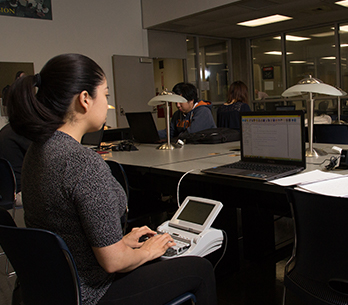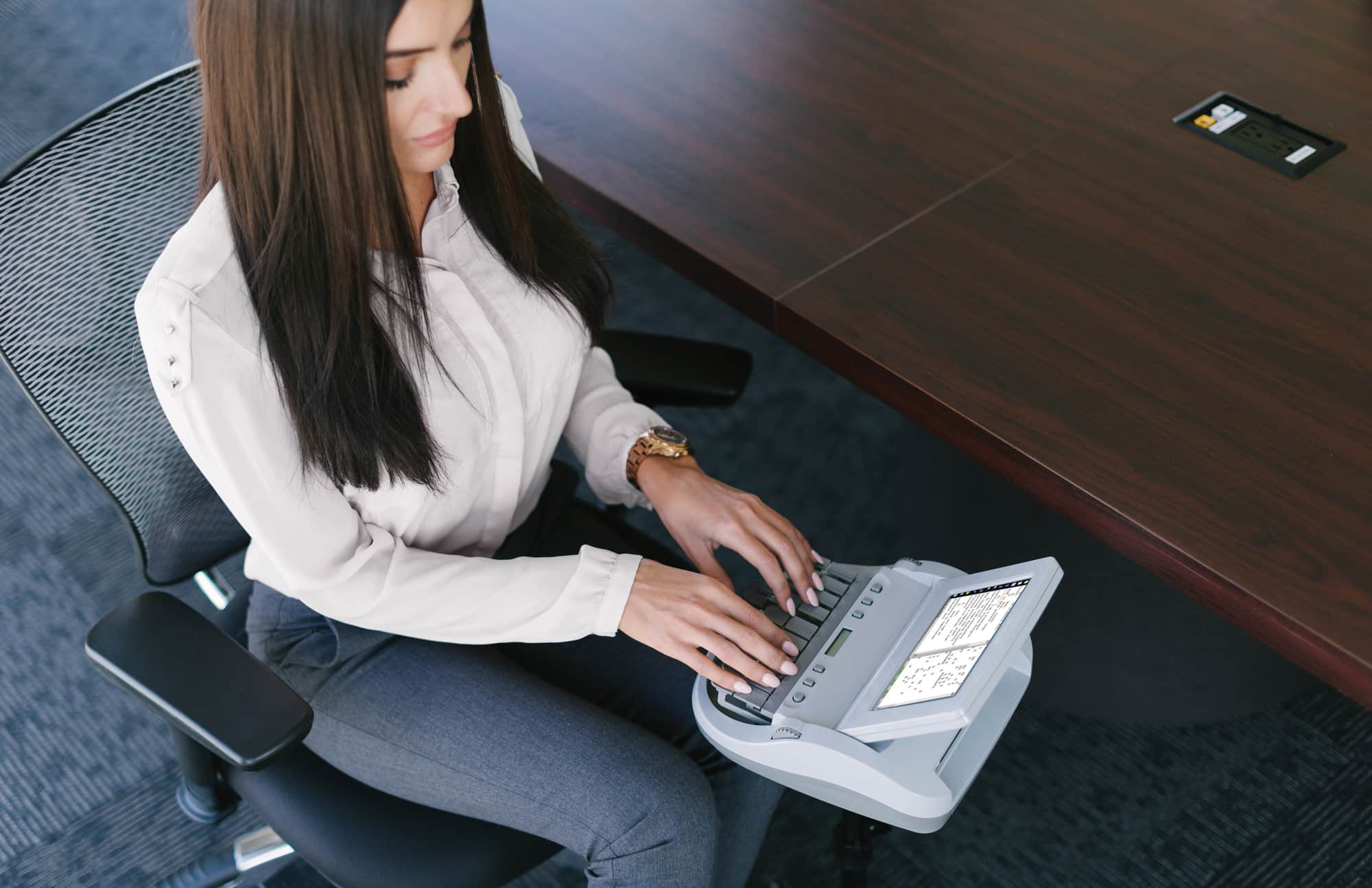Court reporting: How Modern Tools Like Digital Recording Enhance Accuracy
Court reporting: How Modern Tools Like Digital Recording Enhance Accuracy
Blog Article

The Future of Court Reporting: Innovations and Fads Shaping the Sector
As you check out the future of court coverage, you'll notice a shift driven by modern technology and innovation. Real-time transcription and AI applications are reshaping exactly how lawful process are recorded. It raises questions regarding the duty of court press reporters and the abilities they'll require moving forward.
The Impact of Expert System on Court Coverage
As fabricated knowledge continues to evolve, it's improving the landscape of court reporting in ways you may not expect. AI can assess large quantities of legal text, aiding you identify pertinent precedents and simplify situation prep work.
Additionally, AI can enhance the preparation procedure by offering anticipating analytics, which can help you expect trial results based on historical data. This isn't nearly changing tasks; it's concerning increasing your capacities. With AI managing routine tasks, you can concentrate much more on your core responsibilities, such as ensuring precision and giving vital lawful insights. Welcoming these adjustments can position you as a forward-thinking specialist in a changing industry.
Real-Time Transcription: Enhancing Accuracy and Effectiveness
Real-time transcription has actually changed the court reporting procedure, making it simpler than ever before for you to record exact documents on the place. With advanced innovation, you can now supply immediate records throughout hearings or depositions, making certain that all events have accessibility to crucial details immediately. This immediacy not only enhances the overall efficiency of the legal process yet also permits you to concentrate on the discussion, as opposed to rushing to catch up.
By accepting this innovation, you're not just boosting your workflow; you're establishing a new criterion in court reporting that focuses on accuracy and effectiveness. This forward-thinking method placements you at the leading edge of the evolving legal landscape.
The Surge of Remote Depositions

With the growing need for adaptability in legal process, remote depositions have become a game-changer in court reporting. You can currently join depositions from anywhere, eliminating travel time and costs. This comfort allows you to concentrate on what genuinely matters-- preparing your instance.
Remote depositions make use of advanced technology, enabling real-time interaction and paper sharing. You can involve with witnesses and attorneys perfectly, ensuring that every person continues to be linked regardless of their physical location. This method not just conserves time but likewise broadens your pool of expert witnesses, as geographical barriers become much less of an issue.
As remote depositions gain popularity, it's essential to adapt to this new norm. Familiarize on your own with the necessary tools and protocols to guarantee a smooth experience - court reporting. Embracing this advancement can offer you an affordable edge, enabling you to navigate the ever-evolving landscape of lawful process properly
Digital Courtrooms: Transforming the Legal Landscape
As you step right into the world of digital courts, you'll discover how digital hearing innovation is improving legal proceedings. This change not just makes gain access to easier yet also boosts transcription accuracy, ensuring every word is recorded appropriately. Welcoming these improvements can substantially improve the efficiency of the legal process.
Online Hearing Modern Technology
While the conventional court room setting has long been an icon of justice, the rise of online hearing modern technology is reshaping how legal process are conducted. You'll discover that these electronic systems offer unmatched access, allowing individuals to sign up with from anywhere. This flexibility not only saves time however additionally decreases expenses connected with traveling and logistics. Think of having the ability to present your situation without tipping foot in a physical court room. Additionally, virtual hearings can improve engagement, allowing witnesses and specialists to offer statement without the restrictions of place. As you adjust to these adjustments, you'll see that virtual hearings maintain the honesty of the legal process while embracing innovation, ultimately transforming the way justice is served in the modern-day world.
Improved Transcription Accuracy
Enhanced transcription precision is changing the legal area, making court procedures much more reputable than ever. With advancements in speech acknowledgment innovation and AI-driven tools, you can anticipate to see a substantial reduction in transcription errors. These developments not just capture every word spoken yet additionally represent subtleties in tone and context, improving general understanding. Therefore, crucial details aren't shed in translation, making sure that the integrity of the legal procedure is maintained. Real-time transcription allows you to gain access to exact records instantaneously, facilitating smoother communication throughout tests. Embracing these technologies implies you're entering a future where clearness and accuracy in lawful documents are critical, eventually profiting all events involved in the judicial system.
The Duty of Court Reporters in Virtual Hearings
Stenotype reporter play an essential role in virtual hearings, ensuring that every word talked is properly recorded and transcribed in real-time. As a stenotype reporter, you assist in communication between parties, making intricate lawful procedures easily accessible. Your competence in legal terminology and the ability to promptly adjust to different speakers are crucial in this electronic atmosphere.
During virtual hearings, you maintain a steady emphasis, even among technological challenges or distractions. You give a clear, written record that can be referenced later, assisting judges, lawyers, and clients recognize the procedures. Your skills in guiding different systems ensure that you can seamlessly incorporate into any kind of online arrangement.
Additionally, you also assist copyright the honesty of the judicial process, verifying that every participant's voice is listened to. By doing this, you not just improve the performance of legal process but additionally add to the general justness and transparency of the justice system.
Innovations in Paperwork and Record Keeping
As technology progresses, innovations in paperwork and document maintaining are transforming exactly how court press reporters capture and take care of great site legal transcripts. You'll discover that electronic devices permit quicker and a lot more exact transcription, reducing the possibilities of human mistake. Cloud-based storage remedies enable you to securely keep and accessibility documents from anywhere, making collaboration with legal teams seamless.
Man-made knowledge is additionally playing a significant role, assisting with real-time transcription and even providing wise modifying functions. These innovations not only improve performance yet also assure that you can provide premium paperwork in a hectic legal environment.
Additionally, the combination of voice recognition software application enhances the process, allowing you to focus more on the subtleties of the process rather than just typing. By welcoming these technologies, you're placed to raise your skills and meet the needs of contemporary court reporting successfully.
Future Abilities and Educating for Court Reporters
While innovation reshapes the landscape of lawful procedures, it's necessary for stenotype reporter to adapt by getting new abilities and training. You'll need to familiarize on your own with sophisticated transcription software and electronic coverage tools to remain affordable. Embracing artificial knowledge and real-time captioning will certainly enhance your efficiency and precision.
Additionally, creating strong study and logical abilities is crucial. You'll typically experience intricate legal lingo and procedures, so recognizing legal principles will develop your reporting. On-line programs and workshops can offer beneficial insights right into these areas.
Connecting with other experts will certainly likewise aid you stay upgraded on industry patterns. Signing up with organizations or participating in seminars can reveal you to new modern technologies and finest methods.
Finally, honing your social abilities will certainly enhance communication with lawyers and customers. By concentrating on these locations, you'll place yourself for success in the developing area of Continued court coverage.
Regularly Asked Inquiries

What Qualifications Are Needed to Become a Court Reporter Today?
To become a stenotype reporter today, you'll require a high college diploma, specialized training in court reporting, and accreditation, often through a nationwide test. Strong typing skills and focus to information are necessary for success.
Just How Can Court Reporters Stay Updated With New Technologies?
To stay updated with brand-new modern technologies, you must go to workshops, join specialist companies, and sign up for appropriate publications. Connecting with peers and joining on the internet forums can also maintain you informed about the most recent improvements.
What Is the Typical Salary for Court Reporters Currently?
The ordinary income for stenotype reporter varies by location and experience, yet you can expect around $50,000 to $70,000 annually. In some locations, experienced reporters can make a have a peek here lot more, especially with specialized abilities.
Are There Work Opportunities for Court Reporters in Non-Legal Fields?
Yes, there are task opportunities for court press reporters in non-legal fields. You can discover roles in shut captioning, transcription solutions, and media, where your skills in capturing spoken language are very valued and demanded.
Exactly How Does Court Coverage Differ in Different Nations?
Court reporting varies significantly throughout countries. You'll locate differences in terms, technology, and legal systems. As an example, some nations highlight electronic reporting, while others still depend on typical stenography methods for recording spoken words.
Report this page